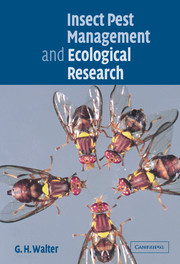Book contents
- Frontmatter
- Contents
- Preface
- Acknowledgements
- 1 Introduction
- Part 1 The place and nature of insect ecology research for IPM
- 2 Pest management as an applied science: the place of fact, theory and application
- 3 Historical trends in pest management: paradigms and lessons
- 4 IPM: a diverse, interrelated suite of socioeconomic and scientific problem-solving activities
- 5 An ecological underpinning for IPM
- Part 2 Specific directions in insect ecology research for IPM
- Part 3 Synopsis: Ecological research for IPM today
- References
- Index
5 - An ecological underpinning for IPM
Published online by Cambridge University Press: 22 August 2009
- Frontmatter
- Contents
- Preface
- Acknowledgements
- 1 Introduction
- Part 1 The place and nature of insect ecology research for IPM
- 2 Pest management as an applied science: the place of fact, theory and application
- 3 Historical trends in pest management: paradigms and lessons
- 4 IPM: a diverse, interrelated suite of socioeconomic and scientific problem-solving activities
- 5 An ecological underpinning for IPM
- Part 2 Specific directions in insect ecology research for IPM
- Part 3 Synopsis: Ecological research for IPM today
- References
- Index
Summary
It should be apparent to all students of applied entomology that while pest-management practices may often be agreeably simple in design and application, their successful development must be based on rigorous understanding of the natural laws that govern the abundance of insect pests and regulate their interactions with all other phases of the living environment.
r. l. metcalf & w. h. luckman (1994, p. xiii)Whether we like it or not, ecologists have to start giving hard answers to some very hard questions. Without a sound theoretical base for our subject, we will be unable to meet the challenges of the next decade and beyond.
j. h. lawton (1989, p. 517)Introduction
Overview of ecology, and chapter structure
Scientific progress is not reliant simply on the collection of facts. Even the entomological research conducted to support pest management practice is influenced in one way or another by underlying theory (Chapters 2 and 3). Sometimes that theory is recognisable only by searching out the unstated assumptions that underpin gathering and interpretation of the data. All the underlying theoretical structures that influence research on pests and beneficials therefore need to be located, scrutinised for the validity of their underlying assumptions, and examined for their practical contribution to IPM (Chapter 2). That a strong theoretical basis for IPM research is needed is perhaps best underscored by our persistent inability to understand the ecology of so many major pests, despite decades of research effort (much of it of a fact-gathering nature), and the low rates of IPM success achieved so far (Chapter 3).
- Type
- Chapter
- Information
- Insect Pest Management and Ecological Research , pp. 89 - 112Publisher: Cambridge University PressPrint publication year: 2003



